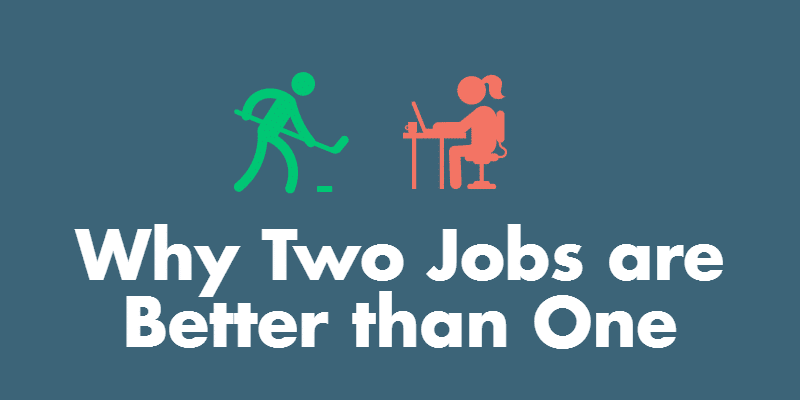
Why Two Jobs are Better than One
As a child, we have so many ideas about what we want to be when we grow up. We want to be a fire fighter and an artist, a chef and a doctor. There are too many exciting options for young minds, and we have the unshakable belief, held up by parents and teachers, that we can do anything we set our minds to. As adults, that all changes. We are told to pick a profession in university, and spend our days preparing and working in this one career. No longer is there talk of all the things we could be, and the idea of changing from your current job often seems a far-fetched fantasy, if we consider it at all.
People have dreams about being in different jobs all the time. A teacher wants to be a location scout. A commercial cleaner wants to skipper yachts. A restaurant owner wants to write books. There are so many other potential careers, but we often dismiss these out of hand as too difficult or risky.
Kabir Sehgal of the Harvard Business Review explains that instead of staying at your current job, bored and unfulfilled, or leaving to a completely new career, the solution is instead, to do it all. Take on two jobs, and you will find ways for both to enhance your quality of life.
Some estimates believe that 65 million Americans, approximately half the working population, will be independent workers in the next decade. Young people are heading this charge, with a survey by PwC finding 97% millennial women saw their work to life balance of almost utmost importance. Having a “portfolio career” allows workers to keep their original, paying job, while exploring other options.
Seghal works in four different areas, and has found ways to succeed in all, often by using tools and skills from his other professions. He is a corporate strategist at a Fortune 500 company, an author, a US Navy Reserve officer, and a record producer, and still finds time to get everything done without burning out.
However, do the benefits outweigh the risks? It can be a daunting idea to strike out in a new area. So how will this benefit you both in your new career, and your old one?
New transferable skills
While the main benefit to a portfolio career is allowing yourself to explore a new avenue, especially in something you have always been tempted to try, it can also help you in your current job.
Samantha Clark, founder of consultancy firm Samantha&, believes you shouldn’t quit any full time job without mapping out your expectancies, and a plan for your future. More than that, you should look at your skill-set, as it is often possible that your skills between your two professions will overlap. “Is there a way the different pieces of your portfolio career could overlap? Are there skills you could develop in one area that could be handy in another? These help make a stronger case for negotiating terms with your boss,” she says.
Seghal sees this the same way. He explains that his employment as a corporate strategist supports his work as a record producer. Because it was something he was passionate about, he volunteered in the industry to gain experience, using his corporate day job to subsidize this time, and the money needed to set up a producing business. With this vision, he managed to produce over a dozen albums and win a number of Grammys. These new skills also taught Seghal how to enjoy his work, and when talking with corporate clients, he would often take them to interact with his recording business, helping generate revenue by introducing clients to fun and a good time. This way, both careers can benefit each other.
A diverse range of viewpoints
Knowing people in range of professions also helps Seghal in giving his corporate clients diverse viewpoints. His contacts as an author allowed him to connect a journalist in China with a client who wanted a “contrarian perspective” that he could not get from inside his bank. This was mutually beneficial to both parties, one receiving a new subscriber, and the other receiving a viewpoint they could not receive within their social and employment circles.
What’s more, knowing people from every walk of life allows you to expand your worldview, which could be pigeonholed by the people you spend your time with. As motivational speaker Jim Rohn once remarked, you are the average of the five people you spend the most time with. Having a more varied base allows you to take in and consider diverse perspectives, helping with understanding and problem solving.
Think more creatively and innovate
If you’re working in different environments, it gives you the opportunity to expand your thinking. As Seghal explained, while he could have set up a non-profit to ask people for money in the wake of Hurricane Katrina, he instead set up a website through which people could hire musicians for a party in New York city. Through this, a tip could be added to go towards New Orleans charities. As a result, he was able to use what he loved doing to help both musicians in New York, and people struggling in the wake of a disaster. The saying goes that there’s more than one way to skin a cat, and this is true with any change or ideas you want to invest in within your life. Having varying viewpoints both through your careers, and also the people you surround yourself with, allows you to come up with things that you may never have thought possible.
It may seem daunting and scary, but by planning out what you want to achieve, and having the skills to do it, you can succeed in more than one area in your life, and end up feeling more fulfilled as result.